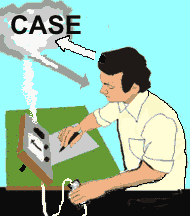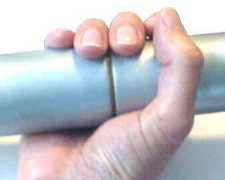
|
| to navigation |
Advanced Ability Level Zero:
Solo Auditing
Alternative Route and
Auditing after Clear

There are numerous actions that can be audited after Clear. Many of them can be done by the Clear person by him- or herself under a qualified case supervisor and after adequate training in the theory. A Clear person auditing self is called a Solo-auditor.
You do not audit the Grades 0-5 Solo. The Grades are always done in a normal session set-up with an auditor and a pc. The reason for this is, that early on the need for an auditor is greater. The pc is more effect of his Bank; less capable of confronting it and separate self out from its influence. Solo-auditing applies only to certain repair actions and special Grades processes after Clear - The Advanced Ability Levels (also called Operating Thetan Levels). Neither here nor in The Road to Clear do we cover these processes except with a general description. Solo-auditing of rudiments, certain Repair Lists, and other set-up actions is included here or training purposes however. As mentioned Solo-auditing has to be done under qualified supervision. This can be done when the Solo-auditor training is complete and the student has done the training sessions.
What we do cover here are the basic skills and drills needed to undertake Solo-auditing. The basic principles of auditing are the same as on the Grades. The Solo-auditor adapts the auditing comm cycle to Solo, does the Solo-auditing observing the Auditors Code, and uses the Meter to determine what to audit and when he or she has finished auditing it by reaching the End Phenomena of that process.
Auditors Trust
In auditing a pc on the Grades we have Auditors Trust as:
Auditor plus Pc is Greater than Pc's Bank.
|
|
|
Auditor + PC > Bank |
In Solo-auditing it becomes Solo-auditor plus Solo C/S is Greater than the Pc's Case.
 |
 |
|
The Solo C/S is not present in the Solo-session. |
|
Even though the Solo C/S isn't present in the session he plays an important role in keeping the auditor on track and disciplined enough to succeed. He has to walk the fine line between keeping the technical procedure straight and the Solo-auditor in-session with him. The Solo-auditor has to feel he or she can tell him anything without being invalidated or evaluated for as a case and receive gentle corrections as well. Thus he has to express appreciation of the pc's wins and cognitions. At the same time he has to wear his technical hat and point out how he can improve his technical procedure. C/S keeps doing this until the Solo-auditor is near perfect or perfect.
Self-auditing Vs. Solo-auditing
Solo-auditing is vastly different from what is called self-auditing.
Self-auditing is usually an attempt to run processes on self without direction,
plan or a Meter. It is not a valid activity in CT. What happens in such attempts
are usually restimulation, incomplete actions and all done on a wrong gradient.
It causes more harm than good. Auditing, to be successful, has to follow a
carefully worked out plan. The pc needs another terminal to communicate with in
order to experience discharge and relief. In normal Grades auditing as described
in this manual the other terminal is the auditor. The auditor is usually being
supervised by a C/S who is there to catch and straighten out any problems occurring
in the auditing. A C/S on the Grades is therefore often seen more as a
disciplinarian by the Grades auditor.
In Solo-auditing the other terminal is the C/S. The C/S sticks to procedures that are fully tested and safe for the auditor to do Solo. He follows the Solo-auditor's sessions closely and is there to help the Solo-auditor out with practical advice, needed processes and remedies, additional training and drilling. If the Solo-auditor runs into problems that seem too difficult the Solo-auditor may need a review session from another auditor. In such a case the Solo-auditor will receive repair actions, usually assisted by a prepared list especially designed to find and handle the types of by-passed charge he may have run into. After such a review session he can return to Solo-auditing.
Solo-auditing and Training
The better trained and experienced the Solo-auditor is as a Grades auditor the
more likely the student is to succeed in Solo-auditing. The minimum requirements for a
Solo-auditor is usually Auditors TRs Course, Meter Course and a course in
Objective auditing and Self Analysis Lists. On top of these basic courses he
does the Solo-auditor's Course. As a case he has to be Clear or complete on
Engram Clearing. Pc's
that didn't go Clear on Engram Clearing is given a Solo program that will take
them to this desirable state of beingness.
A far better preparation to Solo is however to be at least a Class Four auditor and have some experience with handling pc's in session. It comes down to better familiarity with the tools and procedures. Higher confront, less attention on the tools and more free attention on the Solo-auditor's case. The important definition of in-session comes into play here. We have in-session as: Pc willing to talk to the auditor and interested in his case. A poorly trained Solo-auditor who is all thumbs and unfamiliar with the mechanics and tools of auditing will have his attention on all kinds of other things than his case. He will be all caught up in reading the Meter, keeping the report, following the procedure, routine case phenomena and dozens of other things going on.
A skilled Solo-auditor on the other hand can really make progress. Not only can he or she run the designated processes successfully but can also do any and all small repairs needed Solo. This would include flying the rudiments, assess and handle prepared lists, do Prep-checks, etc. A number of these actions are included for training purposes, but are real Solo-auditing as well.
Doing auditing can be compared to playing music. It takes basic skills that have to be mastered and then a theta quality when that is accomplished. There are basic skills such as scales, harmonies, timing, tempo, and handling the instrument which have to be known cold. But there is a vast distance from knowing the basic mechanics of music to actually be able to deliver a musical performance.
If you have ever watched a talent show, where you see musical performers in the rough, you will know what we are talking about. You will have all variations of performers. Some can keep the tempo and hit the notes cleanly and are passable. Those who can't even do that are a dreadful experience to listen to. You may feel this urge to help them out. Lift the off-tune note just that little fraction needed for it to be in-tune. Urge them to increase the tempo so it actually becomes music. You may feel sorry about their stage presence and urge them to boldly perform rather than try to perform and make excuses for their presence at the same time. There are hundreds of small things that have to be done exactly right for it to deserve the name of musical performance. Some of them are tangible skills, easy to point out and teach, others are less tangible but still easy to perceive by the audience. If you watched a talent show on TV and turned off the sound you could still tell who performed well and who didn't. You would mainly observe the audience. If you see the audience members sitting on the edge of their seats and with facial expressions of being ready to jump in or expressing displeasure or pain you would know it wasn't a passable performance. When you looked at the performer himself you may see him all caught up in trying to place his fingers on the guitar in order to make an accord. You may see him sweat nervously and having to use a tremendous effort to produce his music. Any such indicators would tell you he had a long way to go.
On the other hand, when you see an accomplished musical performer there are dozens of signs that reveals his professionalism and high skill level. You can watch a performer of any genre or exotic music and still determine if he is a great musician or not. You don't have to be familiar with, like, or "understand" the music to determine that.
 |
The master of any music
has an |
The master of any music has an aura of competence around him. All technical challenges are overcome effortlessly, whether it is a grip on a string instrument, hitting a high note cleanly, or keeping up a breathtaking tempo on his instrument. A master performer can do all this and at the same time have his attention on the communication of it all, have his attention on the audience. He can really communicate through the music. As a result the audience is "in-session" you could say. They can sit back and relax and indulge in the artistic and emotional expressions of the music with no attention on the technical part whatsoever.
Solo-auditing
When we talk Solo-auditing and training for Solo-auditing this parallel is
very applicable. When the Solo-auditor starts to see the Meter as an
extension of his or her hand and perception, sees the reports out of the
corner of his eyes and effortlessly
can keep adequate notes, when he cleanly can separate himself as auditor from
his case and maintain a silent dialog with his own case, without Q and A, he can really produce results. Self-invalidation in Solo is as harmful as
invalidation is in a normal session. Keeping auditing appointments with self is
likewise necessary.
 |
The Solo-auditor maintains a silent auditing comm cycle with his case and has to hold auditor and case separate. But the basic rules of Grades auditing apply. He holds the special Solo-cans in one hand, writes report and handles Meter with the other. |
There are many small disciplines the Solo-auditor may have to learn and learn to respect to be successful. It comes down to a professional discipline that ideally is second nature to the Solo-auditor. These skills and this discipline is best learned auditing another where the terminals and the separation between auditor and pc is a clear and given thing.
`
|
The special Solo-cans are held in one hand. |
The Solo-auditing drills consists of getting familiar with using the Meter as a Solo-auditor, including the special set of cans held in one hand. They also include drills in using the Solo comm cycle. In Solo the auditor does not express the commands but uses silent intention and acknowledgments to execute the auditing comm cycle.

|
Solo-cans in
use. It is The shown cans are |
|
Home Search Level 0 Level 1 Level 2 Level 3 Level 4 Level 4Pro Level 5 C/Sing Solo |
|
|
| Tech terms | Scales | Axioms | Drills | Checksheets | Processes | Prep. lists | C/S terms | C/S tool | Grades | Cramm | Points | KTW | Online | |